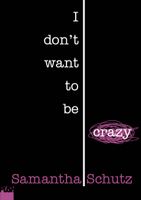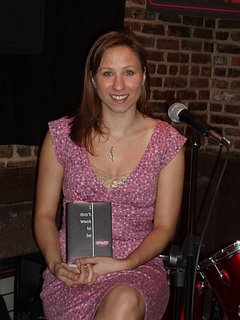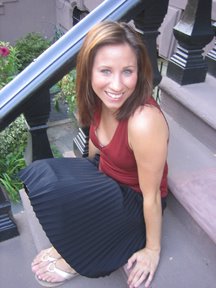
The cover and an excerpt...
 Excerpt from I Don’t Want to Be Crazy, Part II don’t understand what’s happening.
Excerpt from I Don’t Want to Be Crazy, Part II don’t understand what’s happening.I am sitting in Writing Seminar
and it feels like my hands are shaking,
like I’ve got a tremor.
I try hard to focus, stare at my hands,
but I can’t tell whether or not they’re shaking.
I don’t understand why I can’t tell.
I should be able to tell
if my own hands are shaking.
My eyesight can’t be trusted.
I’d try sitting on my hands,
but that would make people stare,
if they haven’t already noticed the shaking.
I try clasping my hands together,
but that’s no good, either.
I can see myself with my hands together,
banging them up and down on the desk
like a piston, like a cartoon sledgehammer.
I see myself doing it,
but I know I’m not.
I can’t be.
If I were, people would be staring.
When class is over,
I am tired and sweaty.
I didn’t see anyone looking at me,
so I must not have done anything crazy.
Maybe I’m getting sick
or maybe I’m finally addicted to cigarettes.
This feeling, the sweating, the shaking—
it must be a nicotine fit.
I go outside with the other smokers,
suck down a few cigarettes before class,
hoping it will make me feel better,
hoping it will calm my nerves.
A friend of Sarah’s from psych classcomes by to pick her up for a party.
Her name is Rebecca.
When I introduce myself
she says that we’ve met before—
that she remembers my eyes.
I feel kind of stupid
for not remembering her,
but she doesn’t seem to care
and invites me to go with them to the party.
When we get there,
Rebecca and Sarah start dancing.
I lean on one of the speakers instead,
let the bass crawl over my back like fingers
and watch kids in big pants
dance in the light and smoke.
Rebecca grabs my hand
and pulls me onto the dance floor.
I can’t stop watching the people around me—
watching what they do,
watching to see if they are watching me
dancing like an idiot.
Rebecca is dancing with her eyes shut
and she is smiling.
She doesn’t care what anyone thinks
and it is amazing.
Rebecca and her friendshave been together since the first week.
There’s her roommate Rachel,
and Amanda, Tara, and Jennifer.
We all hang out in Rebecca’s room and they joke about
how they stopped hanging out with this crazy girl Monica
at the same time they started hanging out with me—
like I took her spot.
Being with them is like walking in
after a play has already started.
You try to slip in quietly and find your seat,
but people turn around,
give you dirty looks,
and whisper to their neighbors
about how rude you are.
A few months ago,leaving for college seemed glamorous,
but now it’s hard to believe
that this little dorm room,
with its scratchy sheets
and a lock that sticks,
is home.
It’s hard to accept
that this is my new life,
that these are my new friends.
I am one in many here.
There are dozens here as good as me,
even more who are smarter,
funnier, prettier.
And it scares me
because before I stuck out
and now I blend in
like a pair of khakis
and a baseball cap
at a keg party.
I can’t sit still in class.I can’t hear what the teacher is saying.
All I can hear is my voice in my head
telling me that things are not right—
that I am not right.
I am trapped in this classroom.
It feels like something
is trying to push its way out of me,
out of my chest.
I feel like everyone can see it bubbling up,
like they’re waiting for me to burst,
to boil over.
I have to get out of here.
I fake a coughing fit and leave,
but once I get in the hallway
I realize I’m still trapped—
stuck inside of this shaking, sweating body.
I’d rip my skin off if I could.
The only place that seems safe
is the bathroom.
Sitting in a stall, with my chest on my thighs,
I try to breathe,
But the more I think about my breathing,
the more I feel like I can’t breathe.
It feels like I have a raging fever,
like my insides are melting.
This must be what it feels like
the moment before you die.
I have been telling myselfthat these feelings are new,
but they aren’t.
I just didn’t connect them before.
I felt it the first time I smoked pot junior year.
At first things were fun,
but then everything broke.
It felt like my chest caved in
and I couldn’t tell the difference
between the bass in the music
and a car alarm going off outside.
I couldn’t get my mind to stop racing.
I felt like I had no control over my body—
like my arms and legs were twitching.
I thought I was going to have to go to the hospital.
I thought I was going to die.
I told myself it was the pot.
But it happened again,
before college,
when I wasn’t high.
I was in Staples with my dad,
shopping for school supplies.
All of a sudden the ground felt soft
and the sounds around me
were too fast and too slow
at the same time.
I thought I would lose control,
do something crazy—start screaming
right there in the pen aisle.
My dad would know.
Everyone would know.
Now this feeling follows me
everywhere I go.
It clings to me,
makes my skin crawl,
makes my skin burn
when I walk across campus,
when I check books out of the library,
when I talk to my friends.
It sits with me in class,
whispers in my ear,
tells me that I shouldn’t be here.
Please God make this feeling stop.I can’t take it.
Breathe.
Breathe.
Breathe.
Make it stop.
Please.
Must concentrate on something,
anything.
8:00 a.m.Smack alarm clock.
Haul ass out of bed.
Shower with very hot water.
8:23 a.m.
Dress.
Paint over dark circles under eyes.
Add color to cheeks.
8:47 a.m.
Eat breakfast alone.
Avoid caffeine.
Try to ignore all the noise.
9:03 a.m.
Smoke cigarette.
Go to Writing Seminar.
9:34 a.m.
Feel light-headed.
Feel like passing out.
Fake coughing fit.
Leave class.
Drink water.
Go to bathroom.
Pull down pants.
Sit on toilet.
Put chest on thighs.
Stare at tiles.
Breathe deeply.
Breathe deeply.
9:39 a.m.
Get a grip.
Return to class.
10:00 a.m.
Go back to dorm room.
Get under covers.
Sleep.
12:45 p.m.
Eat lunch with friends.
Try to ignore the noise.
1:20 p.m.
Smoke cigarette.
Go to Freshman Seminar.
1:46 p.m.
Feel like people are staring.
Feel hot.
Feel cold.
Feel out of control.
Fake coughing fit.
Leave class.
Drink water.
Go to bathroom.
Pull down pants.
Sit on toilet.
Put chest on thighs.
Stare at tiles.
Breathe deeply.
Breathe deeply.
1:54 p.m.
Get a grip.
Return to class.
There’s this warm white lightthat comes in the window
of the waiting room in Health Services.
I’ve been in a bunch of times
for back pain, sinus pressure, dizziness,
a hemorrhoid that I thought was ass cancer.
I like how the blood pressure cuff feels
tight around my arm,
the way the nurses put the cold stethoscope
to my chest and listen,
listen,
listen.
Rebecca, her friends, and Ihang out a lot now,
but I’m pretty sure they think I’m crazy.
One minute I’m fine, talking about homework,
eating lasagna in the dining hall,
and the next I’m complaining
about how dim the lighting is
and running out the door
to get back to my room
and under the covers.
We go to Freshman Seminar together,
but sitting with half the freshman class
crammed into the theater is more than I can take.
Sometimes I go to the bathroom
and don’t come back.
I have moved from the front rowof all my classes to the back.
I can’t take the feeling of people
looking at me, burning holes in my back.
Back here I can hide
my shaking hands and feet.
I have resigned myselfto the fact that I have gone insane.
I am too tired
to keep fighting
the empty feeling in my stomach
and the buzzing in my head.
This was not supposed to be how things turned out.
There were steps taken, expectations—
a specialized kindergarten and elementary school,
a prestigious private high school
complete with a kilt and knee socks,
summer study programs disguised as camp.
This is not
how things are supposed to be.










